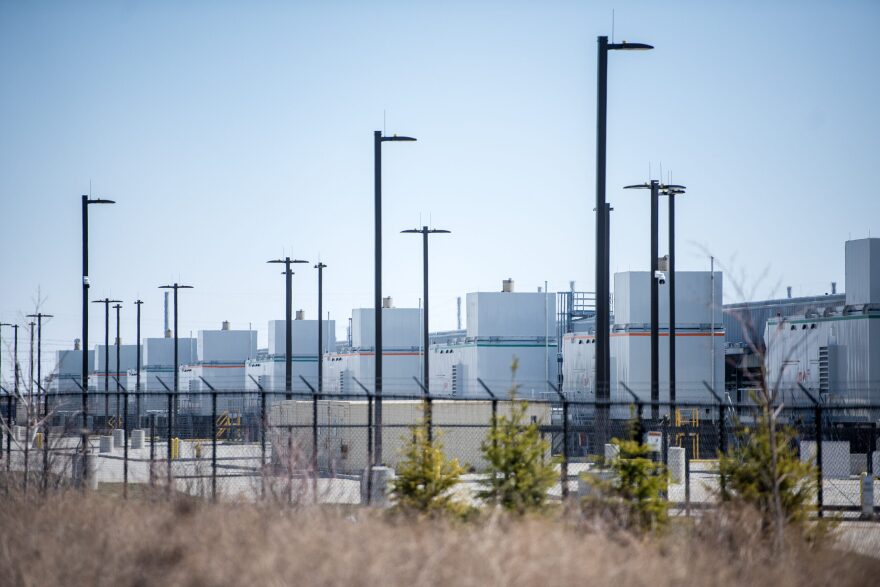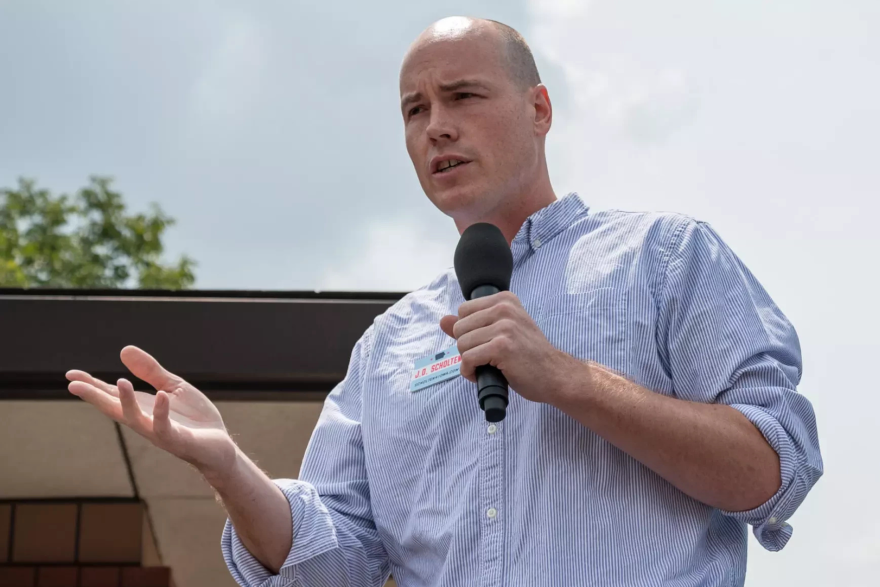In July 2022, a cluster of Microsoft data centers training artificial intelligence consumed about 6% of the West Des Moines monthly water supply.
In the absence of regulations, it wasn't Congress or state lawmakers who addressed the drain on the city's water supply. It was the local water company, West Des Moines Water Works.
The amount of water the data centers needed to cool their systems was unsustainable for the utility. And, it complicated long-term resource planning, said Christina Murphy, general manager.
"We felt like we needed to have something in place about what our abilities were as a water utility," Murphy said.
West Des Moines Water Works and the city of West Des Moines, Iowa, signed a memorandum of understanding to formalize their roles in sustaining the area's water supply, including a clause that said Microsoft data center expansion projects will only be approved if the company reduces its peak water usage.
Facing pressure from city officials and the utility, Microsoft committed to zero‑water cooling systems in all new data center facilities in 2024, including in West Des Moines. This cleared the way for the company to move forward with a sixth AI data center in the area.
Midwest cities are beginning to address AI's growing footprint in the daily lives of residents as state policy lags behind demand for AI resources, and national regulatory efforts remain uncertain.
On July 23, the Trump White House signaled a hands-off approach to AI regulation, according to analysts. And, in Iowa and a few neighboring states, legislatures have been slow to take up the issue.
"The stakes are really, really kind of loaded," said Nestor Maslej, a research manager at Stanford's Institute for Human-Centered Artificial Intelligence. "(AI) is developing quickly and having a lot of implications."
In the case of West Des Moines, those stakes included the viability of long-term water supply to 26,000 accounts, a majority of which are residential addresses, according to Murphy.
An AI magnet
AI helps machines learn from large amounts of data, allowing them to automate processes, analyze information and even generate new content. The technology has been around for decades, but its expanding infrastructure and accessibility have led to rapid adoption across the country in recent years.
In the central Midwest, various forms of AI are now being used in education, health care, policing and parts of life that affect millions of people. It is helping farmers drive combines, suppliers manage inventories and state legislators write floor speeches, according to lawmakers and industry leaders.
"We've been interacting with much of this technology for years, if not decades, especially right here in Iowa. And so this is just the next evolution," said Mollie Ross, vice president of operations at the Technology Association of Iowa. "We see it in truly every industry in our state."
Certain types of AI require immense computational power and data storage capacity, often concentrated in large data centers that require water-fueled cooling systems. Investment in these facilities is skyrocketing in the Midwest, in part because of the region's lower utility and land costs, tax incentives and local permitting, according to industry leaders.

"Power is more affordable in the Midwest. The price of land is more affordable than many other places in the country," said Michael Morey, president and CEO of Bluebird Network, in Data Center Knowledge.
Microsoft has committed approximately $5 billion to $6 billion to its West Des Moines facilities. Google is building a $600 million data center in Lincoln, Nebraska, which is part of a broader $1.2 billion infrastructure investment in the state. And Meta is constructing an $800 million data center in Kansas City, Missouri.
While there are expected economic benefits to these investments, there are no state or federal regulations requiring companies to disclose how much energy and water they are using or what kind of AI technology the centers are powering, according to a review of state statutes by The Midwest Newsroom.
"Are we losing too much water? That was a question. We have to see if there's enough water for both agriculture and all this," said Iowa state Rep. J.D. Scholten.
Scholten, a Democrat, helped pass a study bill in the Iowa House to measure where the state's natural resources are, but it was not taken up by the Iowa Senate, leaving utilities like West Des Moines Water Works to calculate the risks and make their own deals — like the water stewardship Memorandum of Understanding with Microsoft in 2023.
"I want more technology happening in Iowa. I think that's a good thing for the state," Scholten said. "But at the same time, we have to figure out at what cost."

In a statement to The Midwest Newsroom, Microsoft said: "As our datacenter business continues to grow, Microsoft has explored datacenter designs that reduce the intensity with which we withdraw resources. The zero water cooling system, applied to all datacenter designs after August 2024, works to address AI workloads, higher-density chips, and Microsoft's commitment to water sustainability across the globe."
The company did not respond to questions asking if additional Memoranda of Understanding exist with other utilities.
Shifting landscape
In the absence of clear policy, cities are turning to tools like resource agreements and transparency policies to manage some risks. But debates over how — or whether — to regulate AI and its infrastructure persist at every level of government.
"There's disagreement as to whether the best course of action is federally or locally or state level," said Maslej, who helps manage the AI Index, an annual report that tracks AI governance and applications.
The tension over AI regulation was on full display in May when the U.S. House of Representatives passed a version of the One Big Beautiful Bill that would have restricted states from regulating AI systems for 10 years.
"It almost had like a 'caught with your hand in the cookie jar' sort of feeling about it, where they thought — somebody thought — they were gonna sneak it by without anybody noticing," said Nebraska state Sen. John Cavanaugh, a Democrat, who recently sponsored a state AI election advertising bill.
Critics warned the measure could have voided hundreds of existing state AI laws without offering a comprehensive federal policy to replace them, according to an analysis by Public Citizen, a consumer rights group. Supporters said the moratorium would increase AI innovation and avoid a "patchwork" of laws across the country.
"To lead in AI, the United States cannot allow regulation, even the supposedly benign kind, to choke innovation and adoption," Texas Sen. Ted Cruz said in a May congressional hearing on AI.
The Senate ultimately removed the provision from the budget bill in a decisive 99-1 vote, a move driven in part by pressure from Midwest governors and state lawmakers who pushed to protect their ability to regulate the technology in their states.
"The states have gotten very impatient with the federal government," said California Rep. Jay Obernolte, a Republican, at a conference this year. "There is a lack of confidence that Congress is capable of acting on this issue, and so the states are regulating on their own."
California, home to AI leaders like Google, Meta and OpenAI, has taken the lead nationally on state-level AI laws, with at least 42 passed between 2016-2024, according to the 2025 AI Index Report. They address everything from AI deepfake technology to AI-generated content in political advertisements and disclaimers when AI is used in health care.
But in the central Midwest, progress has been slower. Over the same period, Iowa passed just four AI-related laws, Nebraska one, and Missouri and Kansas zero.
Interviews with half a dozen state lawmakers across all four states revealed that the quick pace of AI development, interstate commerce concerns and limited knowledge on the topic are slowing efforts to regulate and address the impacts of AI.
"We don't know much about it (AI), or anybody that I know of does, and we need to get a handle on it, as probably every state in the country does," said Missouri state Rep. Phil Amato, a Republican.
Missouri is one of six states across the country that have yet to enact laws addressing AI-generated sexual deepfakes, according to Multistate.ai. As of mid-2025, none of the states in The Midwest Newsroom's coverage area (Iowa, Kansas, Missouri and Nebraska) have enacted laws governing AI use in political advertising or the use of AI in election procedures. However, several bills are under consideration.
But these measures and others could face added challenges in upcoming sessions.
On July 23, the Trump administration published an AI action plan and issued three executive orders aimed at accelerating AI development.
"America must once again be a country where innovators are rewarded with a green light, not strangled with red tape so they can't move, so they can't breathe, and that's not going to happen," President Donald Trump said at a same-day AI Summit in Washington, D.C.
Part of the action plan includes a hold on state funds for states with "burdensome" AI regulations, but it does not outline what that might include.
"This is just moratorium 2.0," said Chris MacKenzie, vice president of communications at Americans for Responsible Innovation, a nonprofit organization focused on AI policy.
MacKenzie said there are a number of transparency and oversight measures in the action plan that will help give the country a better understanding of what's going on inside the "black box" of AI, but it doesn't put hard rules on companies. One of three executive orders fast-tracks data center permits.
"I think there's going to be a real fight at the state and local level over energy prices, as these data centers kind of suck up more and more energy," MacKenzie said.
Notwithstanding the hands-off view of AI regulation held by many of his colleagues, Sen. Josh Hawley of Missouri, a Republican, in mid-July joined Sen. Richard Blumenthal of Connecticut, a Democrat, to introduce a national law that would authorize people to sue any person or company that "appropriates, uses, sells, or exploits their personal data or copyrighted works" to train AI models without clear consent.
'On the ground'
Beyond West Des Moines, other Midwest cities are also beginning to address AI-related concerns, like transparency, amid uneven legislation.
Earlier this year, the city of Wichita, Kansas, launched a public registry of AI tools and systems used in city government. The registry includes which department is using the tools or system and when it was approved.
"It was built around the idea of transparency, accountability, public trust, and ethical oversight," Wichita city spokesperson Megan Lovely wrote in an email to The Midwest Newsroom.
"[It] lets our residents have a true window into AI use within their City," Lovely wrote, something few states or cities offer, according to the Center for Democracy and Technology.
In Missouri, the St. Louis Board of Aldermen is also focused on AI transparency, specifically in policing. Neighboring St. Louis County drew national attention after a Missouri man was mistakenly jailed due in part to inaccurate facial recognition. This AI-powered technology is used by over two-thirds of U.S. police agencies, according to the U.S. Government Accountability Office.
"The biggest thing, I think, when it comes to AI is just, it's about transparency," said St. Louis Alderman Rasheen Aldridge.

Aldridge, who returned to city government in 2023 after serving in the Missouri House of Representatives, said he believes local leaders are best positioned to respond to these concerns.
"Local governments are where people have more of a pulse on the ground," Aldridge said. He added that he feels the impacts of AI on his city already, enough that he sponsored an ordinance requiring all city departments to publicly report AI technology purchased with taxpayer dollars.
It is a continuation of the former mayor's executive order to govern how the St. Louis Police Department utilizes AI in policing, but it faced backlash from critics who said it would restrict the department's ability to do its job.
"Not trying to, in my opinion, make law enforcement jobs harder. But, you know, we want to make sure that, hey, there's not like a camera that's going to be infringing on people's privacy rights," Aldridge said.
Still, experts warn that city-led AI policies can only go so far.
"Cities aren't in a position to, like, govern algorithms," said Angelina Panettieri, legislative director of technology and communications for the National League of Cities. "There's a lot of things that we really do need a national framework for," she said.
The Midwest Newsroom is an investigative and enterprise journalism collaboration that includes Iowa Public Radio, KCUR, Nebraska Public Media, St. Louis Public Radio and NPR.
There are many ways you can contact us with story ideas and leads, and you can find that information here.
The Midwest Newsroom is a partner of The Trust Project. We invite you to review our ethics and practices here.
METHODOLOGY
To report this story, Naomi Delkamiller interviewed six state lawmakers across The Midwest Newsroom's four-state coverage region to understand the current state of artificial intelligence legislation. She searched for mentions of AI in state statutes and pending bills across Iowa, Kansas, Missouri and Nebraska on legislative websites and databases including LexisNexis. She reached out to policy analysts and experts to understand the current impacts of AI facing states and cities. She also spoke with leaders in three Midwest cities who are pioneering responses to AI's growing impact on resources and personal privacy.
REFERENCES
West Des Moines Water Works MOU with West Des Moines (2022)
West Des Moines Water Works MOU with Microsoft (2023)
House version of tax bill, including AI moratorium (2025)
Stanford AI Index Report (2025)
America's AI Action Plan (2025)
TYPE OF ARTICLE
Enterprise — An in-depth examination of a subject requiring extensive research and sourcing.
Copyright 2025 Iowa Public Radio News



